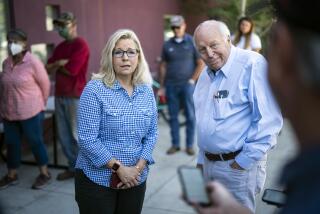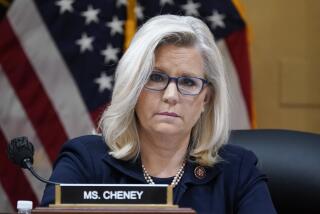HUMANITIES CHIEF VS. PBS’ ‘AFRICANS’
WASHINGTON — “Get the Constitution in the background,” Lynne V. Cheney suggested with a smile to the photographer.
The petite blond chairwoman of the National Endowment for the Humanities, who wields a rapier-sharp sense of humor, pointed to the framed parchment above her desk. A trio of parchments came with the office. They were there before her arrival five months ago, before her presidential appointment and congressional approval.
“I certainly would never take them down,” Cheney added with reverence, “. . . the Constitution, the Declaration of Independence and the Bill of Rights.”
The Constitution and the nation’s heritage are very much on the chairwoman’s mind these days, as she deals with the discord prompted by her successful fight to remove the endowment’s name from the credits of the controversial PBS series, “The Africans.”
Officially, Cheney, a former editor and writer at the Washingtonian, has labeled the series “an anti-Western diatribe” and “politically tendentious.” (Airing tonight at 9 on KCET Channel 28 is Part Four of “The Africans--Tools of Exploitation,” one of Cheney’s major bones of contention with the nine-part series.)
Unofficially, as she confided in her bright, homey suite at the Nancy Hanks Center, “I’ve told people, ‘The perfect way to watch “The Africans” is to turn the volume off.’ ”
A member of the Bicentennial Commission to celebrate next year’s 200th anniversary of the Constitution, Cheney invariably sprinkles remarks with talk of “values” and the need to “restore a sense of historical awareness.” She calls it her “absolute bottom line for everything.”
How to interpret that bottom line of values, however, is as much at the heart of “The Africans” controversy as the content of the series, which was written and narrated by Ali A. Mazrui, a Kenyan who is a political science professor at the University of Michigan and at the University of Jos in Nigeria.
Critics have suggested that Cheney’s action was a violation, not of the letter, but of the spirit of the Constitution’s regard for free inquiry and free speech. Or, as Ward Chamberlin, president of WETA, which co-produced the series with the British Broadcasting Corp., wrote last week in the Washington Post: “During most of its history, the endowment has understood that our own views are enriched and toughened when they are challenged in free inquiry and unhindered study--which are among the most fundamental of Western values.”
“I feel so firmly that what I did was a defense of free speech,” Cheney asserted. “You cannot have government agencies underwriting propaganda of any kind. If government agencies can underwrite propaganda unremittingly critical of the United States, then government agencies can underwrite propaganda unremittingly praiseworthy of our policies, and neither of these situations is correct.”
Might one person’s propaganda be considered another’s scholarship? “I don’t think it’s necessarily true,” Cheney retorted.
“There’s an important point to be made about freedom of expression, the First Amendment, this whole issue,” Cheney said. “Which is, that anybody can produce any sort of television that he or she might desire, as biased a production as he or she wants, and that has always been. . . . But when you have the taxpayer doing the underwriting, then it seems to me that you defend the Constitution, you defend the First Amendment certainly, by asking, by demanding, balance.”
Asked whether balance could not be achieved through funding a multitude of broadcasts, Cheney contended, “We have guidelines that state: We want balance.”
In every program? “In television, in our media guidelines, it says specifically, ‘(a balance of) competing perspectives,’ and not one political point of view.”
Cheney argues that “The Africans” violated not only its own grant application promising “a wide spectrum of opinions and outlooks . . . on camera,” but also flouts endowment guidelines.
The guidelines prohibited funding “projects directed at persuading an audience to a particular political, philosophical, religious or ideological point of view . . . “ as well as “projects examining issues of current controversy without the balance of competing perspectives.”
Although WETA’s grant application was submitted in January, 1984, when both guidelines were in effect, the second guideline--specifically requiring “the balance of competing perspectives” in programming--was dropped in June, 1984. Cheney allows that “the requirement for balance” is covered by the first guideline and that the second is “redundant.”
As she told the President’s Committee on Arts and Humanities two weeks ago: “It’s always painful to have to criticize one of your children. . . . It was important to get out that this series was not balanced as our guidelines required.”
As an example of a “balanced” program “which does exactly what the endowment hopes,” she touted PBS’ “Huey Long” for taking a “controversial personality” and interviewing people who “loved” and “loathed” him.
The Cheneys are a prominent Washington couple. Rep. Richard Cheney (R-Wyo.) is chairman of the House Republican Policy Committee and was Gerald Ford’s chief of staff. The Cheneys, both 45, co-authored “Kings of the Hill,” a well-regarded work on House speakers. They have two daughters, Elizabeth, 20, and Mary, 17.
Lynne Vincent Cheney grew up in Caspar, Wyo., the daughter of a deputy sheriff (her mother clerked at the station) and a federal reclamation agent/engineer (father). She met Dick Cheney in junior high. She attended Colorado College on scholarship. She followed Dick, a political science major, to Wisconsin for their graduate degrees; they were married in 1964.
With the new Nixon Administration, the Cheneys moved to Washington in ’69. He became special assistant to the director of the Office of Economic Opportunity. As soon as she got her doctorate in 1970, she looked for a job.
“The Ph.D. glut was at its height,” she recalled. “(That), plus being female, together was a terrible combination. I went to one English department in the Washington area where the chairman interviewed me and said, ‘Dr. Cheney, are you married or are you really interested in a job?’ Four years later, he couldn’t have done that. It would have been illegal.”
Then she really benefited from the women’s liberation movement?
“I did? “ And without missing a beat: “I suppose we all did. As did we all.”
As it happened, Dick Cheney was one of more than 50 members of the House who wrote to the Corp. for Public Broadcasting urging a review of program practices and policies. Last Thursday, PBS, which receives federal funds through CPB, agreed to a review.
At NEH, Lynne Cheney is backing the Bicentennial Bookshelf, offering $500 matching grants to libraries to stock works on the Constitution. She also has invited grant applications for TV and radio biographies “on American men and women who were leaders of their times.”
What prompted Cheney to watch “The Africans” last August was the $50,000 request for promotional funds. The endowment had already given $600,000 toward the $3.5-million project and the rest was expected. “Well, I hadn’t promised it,” she began, then softened: “Yes, it (the $50,000) would have gone automatically, the council (National Council on the Humanities) had voted on it, but it hadn’t been released. Since it was such a major film, it seemed only sensible that I sit down and take a look at it.”
Cheney watched the series in her office over a period of several days--”the decent thing to do.”
“And I sat down with great expectations,” Cheney said, “which were immediately fulfilled in that wonderful opening sequence. ‘The Africans’ has beautiful pictures, but then I began to hear Prof. Mazrui’s narration, and that of course is the problem.”
Asked when she first believed something was awry in content, Cheney replied: “The first segment, wasn’t that the one where the phrase, ‘Capitalism kills for profit,’ is used? I got the segments in total confusion in my mind, but certainly by the time you get to the opening of (Part) Three with the bust of Karl Marx and ‘the last of the great Jewish prophets,’ which is out of the film now.
“(Part) Four is what really I think shows (Mazrui’s attitude). . . . Oh yes, the women in (Part) Two. There is a view that somehow it is a mistake to take women away from the kind of field work that traditional African cultures see as their role and put them into offices. The typewriter is going to be their ruin. There’s a lot of what Prof. Mazrui says that just sort of makes you curl up your forehead and say, ‘ What? ‘
“You always think in suspended judgment until it’s all through, but I think the ninth program”--the program, she wrote to Chamberlin, “extols the virtues of Moammar Kadafi”--”certainly did a nice job of convincing me.”
Asked whether she saw any value in having an African or Third World point of view represented, Cheney responded easily: “I do not think that Mr. Mazrui represents Africa or the African point of view. . . . In that particular segment in which Kadafi is glorified, where, for example, is the on-camera interview with the Egyptian delegate to the recent meeting of non-aligned nations in Zimbabwe (who) suggested that Kadafi was mentally disturbed?”
In withdrawing the endowment’s logo, Lynne Cheney set precedent. Asked why she didn’t put a simple disclaimer on the broadcast, she said: “The remedy I sought was the one that was specifically authorized by our legislation.”
Last year, in legislation reauthorizing the endowment’s existence, standard procedure for government agencies, the endowment chair was allowed to “prohibit (grant recipients) to use the name of, or in any way associate such project, production or program with the Endowment.”
And, she said, “the roof would have caved in” if she had done nothing. To Reed Irvine, head of the conservative media watchdog group Accuracy in Media, and others who have inquired as to why she isn’t getting the endowment’s $600,000 back, Cheney explained:
“Here you are, working with government lawyers, paid by the taxpayers, trying to get taxpayers’ money back from an institution partly supported by the taxpayers. . . . It would be a long and lengthy suit, and it appears to me like you would be pouring money down a rathole.”
Cheney is determined that a situation like “The Africans” will not occur again. “We will be making many more site visits to wherever the film is being produced” to make sure “things are going according to the . . . application.”
As for cost, “we will have to work it into our budget. In this case (‘The Africans’), the trip would probably have been to England where it was being edited. In any case, go out, make a little friendly visit. . . . “
More to Read
Sign up for Essential California
The most important California stories and recommendations in your inbox every morning.
You may occasionally receive promotional content from the Los Angeles Times.










